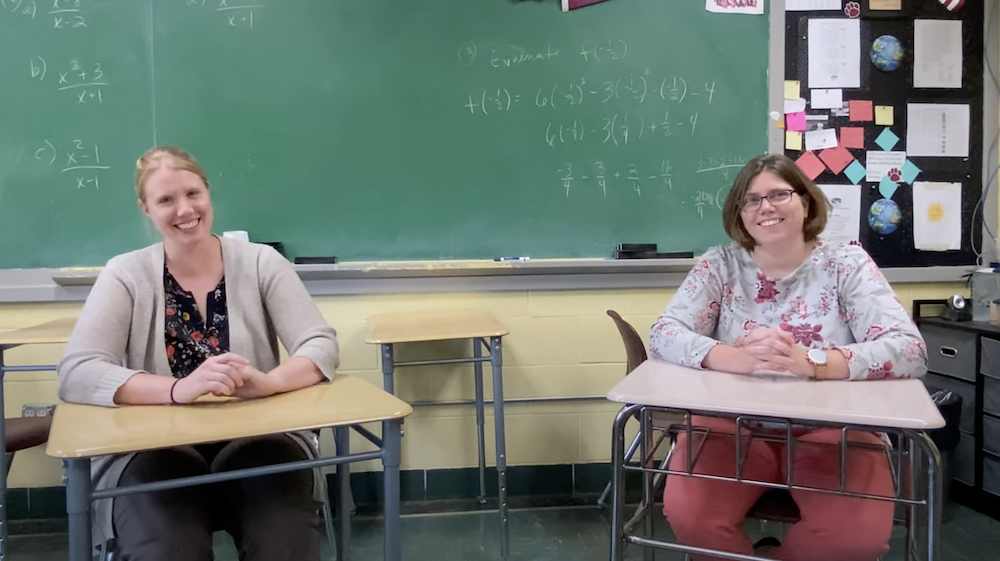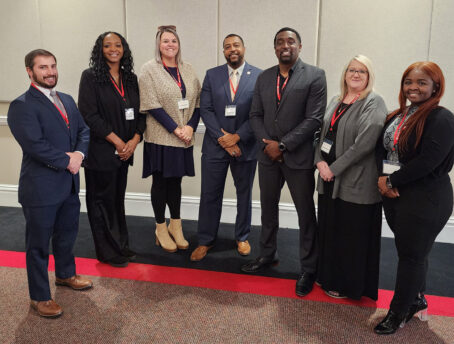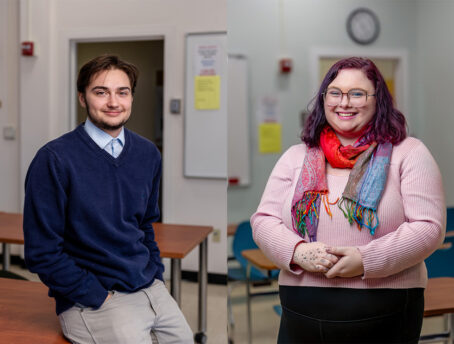In rural places, teachers must work in close collaboration to give their students the best education experience possible. For Emily Dricoll and Erica Zieren of Carmi, IL, this dedicated teamwork culminated in a tight-knit high school math department. Despite the challenges of teaching in a rural town, both teachers emphasize the advantages that small class sizes, close interpersonal relationships, and community connectedness have in their classrooms.
Carmi is a rural community of about 5,000 people located in Southern Illinois, near the Shawnee National Forest. For both Emily and Erica, living in a rural community like Carmi was always part of the plan.
“I have always been from a rural area, and I grew up in a smaller county...in an even smaller school,” Emily explains. “So I don't think the question of not being in a rural school ever occurred to me. I think I always saw myself in a rural school.”
“I was raised here in Carmi and I'm still teaching here in Carmi,” says Erica. “I grew up in a rural school, and I went to a rural college. Teaching in a rural high school...that's just always been me. I don't know what else there is other than rural.”
Despite the desire to stay rural, Emily did not always want to be a teacher.
“When I was in high school, and maybe my first year in college, I thought, ‘I am not going to be a teacher.’ But then I was taking all these courses trying to keep as many options open and available as possible, and my calculus teacher was like, ‘Have you ever thought about teaching?’ After she asked me that, I really thought about it...I thought, ‘You know what? Yeah! I want to help students do what they want to do and not let math hold them back.”
Erica, on the other hand, says there was no doubt in her mind that she wanted to shape young minds in Carmi.
“I absolutely loved my school experience here; I had some of the best teachers. They were able to truly focus on me and help me grow. It was just such a great experience as a student that I wanted to return the favor to my community for everything they had done for me growing up. I wanted to stay in the community and do it for the next generation of kids.”
Both teachers agree that having a supportive team of faculty and staff is crucial to a functional rural school environment.
“We talk at school and when we can we will text,” shares Emily. “I always know I can go see them and talk about what's going on with my students...and they're always there to listen and then offer advice.”
“We have a great teaching team. The math department...there's three of us, we get along great,” says Erica. “Not only do we work together in school, but also out of school. [Emily] and I are both taking some graduate level classes right now together, so we're constantly going over homework assignments together and being students again together.”
They also stress the advantage of having smaller class sizes - not just for learning, but for building relationships.
“My smallest class is 11 students,” says Erica. “So I can focus a whole lot of one-on-one attention with them. My largest class is 28, but even with 28 it's still small enough that the ones who need one-on-one attention can get it.”
“You get to know the students and little things about them that have nothing to do with your content area,” shares Emily. “We get to know them and just develop rapport and relationships with certain ones.”
One challenge that many math teachers face is a disinterest in the subject, and for Emily and Erica this is no different. However, they each see how other interests can motivate students to learn, including taking elective math courses.
“I think as [students] get older and they're starting to think, 'Oh, wow, I may not be in this building every day forever’...they start thinking about their futures, and we can use that as motivation,” says Emily. “Before, [we lacked] the advanced level classes, those additional options for students who want to go above and beyond, but now luckily we're doing dual credit college algebra.”
“We have a lot of students who just want to go straight to the workforce, or a vocational trade-type school,” explains Erica. “So we have a lot of our elective classes - the welding, the manufacturing, things like that - where they're actually using math...without being in a math class. Kids always ask, ‘When am I ever gonna use this?’ I’m like, ‘Well let me tell you...when we built this from scratch...we had to know some angle measurements, so I did trigonometry.’ And they're like…’You weren’t supposed to have an answer for that.’ I love having those answers in my pocket.”
Outside of the classroom, both Emily and Erica enjoy getting involved in the Carmi community, and seeing their students get involved as well.
“I'm just one of those people that [gets] involved in a lot of things. I have a hard time saying no,” laughs Erica. “A lot of the organizations in our town - volunteer organizations, service organizations - a lot of them are headed up by teachers in our district. Teachers, we do have the heart to impact the community more than just in our building. A few years ago, the kids and I all pulled together and created a dog park. Working with city council and the mayor...the kids were able to take our school vision and turn it into something real for our community. ”
“I will be here to help...whatever extra help is needed,” says Emily. “The community's a family - the school, the students, and all the faculty and staff - it's like a family, and everyone pulls together to support each other and be there for each other, especially in times of need. It's definitely a way of life, and I honestly don't feel like I know any other way of life.”
Reflecting on their favorite lessons to teach, both Emily and Erica agreed that resilience and confidence are qualities that they instill in their students.
“I think math is always like a continuous life lesson because a lot of times you don't get it on the first try, but you've got to stay positive. You've got to work hard and persevere,” says Emily. “I tell [my students] too sometimes, ‘I hope that you learn to figure out what to do when you don't know what to do...be a problem solver.’”
“I've told all of my classes this year that if I teach them nothing about math, I will teach them how to have confidence in their work and their ability,” says Erica. “We have seen them develop and...graduate and go on to college, and then out of the blue they get back with you and say, ‘Hey...thanks for when you did this for me.’ That’s my favorite part of the whole thing...it may not be a specific lesson or memory, but it's just the whole atmosphere of why we do what we do.”
They also agree that these are qualities any rural teacher should have, and leave anyone looking to teach rural with this advice.
“Don't let the lack of resources that your community can't afford keep you from thinking outside the box,” says Erica. “Just because you may not have the money to get this equipment or the personnel available to do this particular club, item, whatever it is that you want - don't let that contain you.”
“Don't be afraid to ask for help,” says Emily. ”There are people everywhere that will support you, they'll be there for you.”
We are grateful to Emily and Erica for sharing their story with us about how collaboration looks in their rural community. We ask readers to take a moment to read a gratitude letter from our staff member Hailey Winkleman about Emily’s impact in her own life, and consider making a contribution in honor of a teacher that impacted them.
If you would like to share 30 minutes of your time for an interview, please reach out to us at info@ruralschoolscollaborative.org. The I Am A Rural Teacher campaign is a collaborative effort with the National Rural Education Association and made possible through a grant from the Bill & Melinda Gates Foundation.





